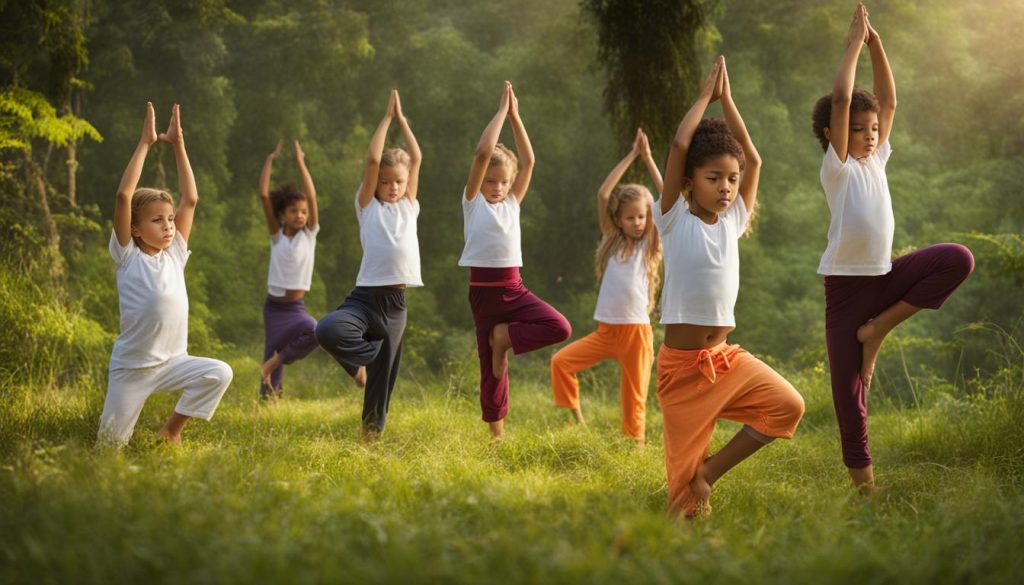As a young person, you face many challenges that can impact your mental health and well-being. From academic pressure to social stressors, it’s understandable to feel overwhelmed at times. But did you know that practicing meditation can help you promote mental clarity, reduce stress, and cultivate inner peace?
Research has shown that meditation can have a positive impact on the mental health and well-being of young people. By incorporating meditation into your daily routine, you can learn to manage stress, improve focus, and develop a greater sense of self-awareness.
This section will provide you with an introduction to meditation for young people. You will learn how to use meditation as a tool to promote mental well-being and discover different techniques and practices that are suitable for adolescents.
Key Takeaways
- Meditation can be a valuable tool for promoting mental health and well-being in young people.
- Regular meditation practice can help reduce stress and improve focus.
- There are various meditation techniques and practices that are suitable for teenagers.
- By incorporating mindfulness into your daily routine, you can promote greater self-awareness.
- Meditation programs specifically designed for young people can be helpful in establishing a consistent meditation practice.
The Benefits of Meditation for Youth
Meditation has been found to have numerous benefits for young people. Regular meditation practice can lead to improved mental health, reduced stress levels, and increased overall well-being.
Mindfulness techniques are particularly suitable for teenagers and can help them develop a sense of awareness and presence in the moment. Practicing meditation exercises, such as breath awareness and body scan, can also help adolescents develop a regular meditation routine and maintain a sense of calm and focus throughout the day.
“Studies have shown that meditation can have positive effects on the brain and may help to improve concentration, memory, and emotional regulation.” – John Mindful, mindfulness expert
Meditation for Mental Health
One of the biggest benefits of meditation for young people is its positive impact on mental health. Studies have shown that regular meditation practice can reduce symptoms of depression and anxiety, and help young people manage stressful situations more effectively.
Mindfulness Techniques for Teens
Mindfulness techniques are particularly effective for teenagers, as they can help them develop a sense of awareness and presence in the moment. Mindfulness can also help young people develop better decision-making skills, increase empathy, and improve their relationships with others.
Meditation Exercises for Adolescents
There are many meditation exercises that are suitable for adolescents. Breath awareness, body scan, and guided meditation are just a few examples of techniques that can help young people develop a regular meditation practice.
Teaching Meditation to Young Adults
Introducing meditation practices to teenagers may seem daunting, but it can be a fun and rewarding experience for both the mentor and the mentee. When teaching meditation to young adults, it’s essential to find techniques that resonate with them.
One effective approach is to use mindfulness techniques for teens, such as visualizations and body scan exercises, which help them become more aware of their thoughts, emotions, and physical sensations. These practices can also aid them in developing self-regulation skills and managing stress.
Moreover, utilizing meditation programs for teenagers can be beneficial as they are tailored to the young adult’s specific needs and preferences, making the experience more engaging and relevant.
When teaching young adults, it’s crucial to create a safe and supportive environment that encourages open communication and active participation. Additionally, being patient and understanding that everyone has their unique learning pace and style can make a massive difference in their journey to mindfulness.
Understanding Mental Health Practices for Youngsters
As youngsters continue to develop and grow, it’s crucial to ensure that they practice good mental health habits. Meditation is one excellent way to promote well-being in youth, and there are several other mental health practices that they can engage in to enhance their emotional wellness.
Encouraging regular physical activity and reducing caffeine intake are two practices that can help youngsters maintain healthy mental states. Additionally, maintaining a regular sleep schedule and reducing time spent on electronic devices can help promote better sleep, which is essential for good mental health.
When combined with meditation, these mental health practices can facilitate a stronger sense of self-awareness and control over one’s emotions. Indeed, meditation can enhance the benefits of these other practices by helping youngsters develop greater insight into their thoughts and feelings, which can help them manage stress and anxiety more effectively.
If you’re looking to promote mental health practices in youngsters, consider incorporating meditation into their routine. With the potential to enhance overall mental health and well-being, meditation is a beneficial practice that can help youngsters cultivate greater emotional resilience and maintain lasting mental health habits.
Managing Stress through Meditation
Stress is a common experience for young people, but it can be overwhelming and detrimental to their mental health. Meditation can be an effective tool for managing stress and anxiety, helping kids and teenagers find a sense of calm and ease in their daily lives.
One stress relief technique for kids is the body scan meditation, where you lay down and focus on each part of your body for a few moments, relaxing any tension or discomfort you feel. For adolescents, a mindfulness technique that can help manage stress is the breath awareness meditation, where you focus on your breath and observe it without judgment.
Using meditation exercises for adolescents, such as the mindfulness-of-breath or body scan, can promote a sense of physical and mental relaxation, reduce anxiety, and improve sleeping patterns. Additionally, using mindfulness techniques for teens, such as aware breathing, body scanning, or loving-kindness can increase self-awareness and allow for better stress management.
Remember, managing stress through meditation is a process and may take some time to see the benefits. Encourage young people to be patient and persistent in their practice, and to notice how they feel after each session.
Raising Mindful Children
As a parent or caregiver, you play a crucial role in helping children develop life-long habits that promote well-being and mindfulness. By introducing your children to meditation and mindfulness techniques, you are setting them up for a healthier, happier future.
One way to encourage mindfulness in children is to make it a family practice. Practicing meditation together can create a loving and supportive environment that helps children feel more comfortable with the practice. Start with a simple meditation, such as a breath awareness exercise, and gradually build up to more extended sessions.

“Encouraging mindfulness in children can be as simple as incorporating simple meditation practices into your daily routine together.”
Another helpful tip is to incorporate mindfulness into daily activities, such as mealtimes or playtime. Encourage your children to focus on the present moment and celebrate the simple pleasures of life.
Ultimately, the goal is to help children develop a life-long practice of mindfulness that will benefit their mental health and overall well-being. By raising mindful children, you are investing in their future, and giving them the tools to lead happier, healthier lives.
Introduction to Meditation Techniques for Young People
If you’re new to meditation, it can be overwhelming to know where to start. That’s why this section will introduce you to different meditation techniques that are suitable for young people like you. These techniques can help you cultivate mindfulness, reduce stress, and promote emotional well-being.
One type of meditation you might try is guided meditation. This involves listening to an instructor or audio guide who will take you through the meditation practice step by step. Guided meditations can be found online, in apps, or through meditation courses.
Another technique you may explore is breath awareness. This technique involves focusing your attention on your breath as a way to anchor your mind in the present moment. When your mind starts to wander, gently bring your focus back to your breath. This practice can help you calm your mind and reduce stress.
A third technique you might try is the body scan. This involves systematically scanning through your body, starting from your toes and moving up to your head, and noticing any sensations or tensions you may feel along the way. This practice can help you develop body awareness and reduce physical and emotional tension.
Exploring different types of meditation can help you find the technique that resonates best with you. Remember that meditation is a skill that requires practice, so be patient and persistent. Over time, you’ll develop your own meditation routine that supports your mental and emotional well-being.
Benefits of Meditation for Young People
Creating a Meditation Routine for Young People
Developing a regular meditation practice is crucial in reaping the long-term benefits of mindfulness. However, getting started and staying consistent can be challenging, especially for young people. Here are some practical tips for creating a meditation routine:
Find the Right Time and Place
Identify a time and place where you can meditate without interruptions or distractions. This could be early in the morning before school, during a break in the afternoon, or before going to bed. Choose a quiet and comfortable spot that you can associate with a sense of calm and relaxation.
Start Small
When starting a meditation practice, it’s important to start with small increments and gradually increase the duration. Start with just a few minutes each day and gradually work up to longer intervals, such as 10 or 20 minutes.
Make it a Habit
Consistency is key when it comes to developing a meditation routine. Make meditation a daily habit by setting aside a specific time each day and sticking to it. Use the same spot, sit in the same posture, and use the same technique each time to create a sense of routine and familiarity.
Overcoming Challenges
Distractions, resistance, and boredom are common challenges that can arise when meditating. When this happens, acknowledge the distraction or feeling without judgment and gently bring your focus back to your breath or the object of your meditation. It’s also helpful to try different techniques or styles of meditation to find what works best for you.
Remember, developing a meditation routine takes time and patience. Be kind and compassionate towards yourself and allow yourself to enjoy the process of cultivating self-awareness and well-being.
Mindful Practices for Daily Life
Integrating mindfulness and meditation into your daily routine can help you promote your well-being through meditation. It is essential to cultivate mindfulness in all aspects of life, whether you’re eating, walking, or interacting with others, to achieve the full benefits of meditation.
To incorporate mindfulness practices into your daily life, try to:
- Eat mindfully: Take the time to savor your food and avoid distractions like electronic devices. Focus on the senses and appreciate the food you’re eating.
- Relax your mind and body: Practice breathing exercises or light stretching to relax your mind and body, even for a few minutes a day.
- Walk mindfully: Pay attention to your surroundings when walking, focus on each step, and enjoy the moment without distractions.
- Be present in your daily activities: Focus on the task at hand, be present in the moment, and avoid multitasking.
By becoming mindful and incorporating meditation into your daily routine, you’ll unlock the benefits of reduced stress levels, improved mental clarity, and increased emotional well-being.
Fostering a Supportive Meditation Environment
Creating a supportive environment for young people to practice meditation is crucial in promoting well-being in youth through meditation. As a parent, educator, or community leader, you have the power to cultivate a positive and inclusive atmosphere that encourages meditation and helps youngsters develop a regular practice.
Make Meditation Accessible
One way to foster a supportive meditation environment is by making meditation accessible to all young people. This includes providing resources such as meditation books, apps, and guided meditations, as well as ensuring that meditation programs are available to teenagers from all backgrounds and socioeconomic statuses.
Provide a Safe Space
It’s essential to provide a safe space for young people to practice meditation without judgment or pressure. Encourage an open and honest dialogue about meditation, mental health practices for youngsters, and its benefits, while empathizing with individuals’ different experiences and needs.
“Meditation should be a comfortable and positive experience for young people, not a stressful one. Offering support and understanding can help to create a relaxed and encouraging meditation environment.”
Lead by Example
As a parent, educator, or community leader, leading by example can be a powerful tool in promoting meditation practices for teenagers. Incorporating mindfulness practices into your own life can help young people see the positive impact of meditation and encourage them to develop their practice.
Consider attending meditation classes or retreats for yourself and sharing your experiences with young people. You may also want to use your positive influence to encourage local organizations to offer meditation programs for teenagers or start one yourself.
Addressing Common Challenges and FAQs
Starting a meditation practice can be challenging, especially for teenagers who may feel overwhelmed by stress or distractions. Here are some common challenges and frequently asked questions related to meditation for young people:
How do I find time for meditation?
Finding time for meditation can be difficult when you have a busy schedule, but it’s important to prioritize your mental health and well-being. Try to set aside a few minutes each day for meditation, even if it means waking up a little earlier or taking a break during the day. You can also incorporate mindfulness practices into your daily activities, such as mindful breathing or mindful eating.
How can I stay focused during meditation?
Distractions are a common challenge during meditation, but with regular practice, it becomes easier to cultivate focus and concentration. Try to find a comfortable and quiet space for meditation, eliminate distractions like your phone or computer, and use guided meditations or focused breathing exercises to help you stay present.
What if meditation doesn’t seem to work for me?
Like any new skill or practice, meditation can take time to master. If you’re not seeing immediate results, be patient and continue to practice regularly. You may also want to explore different types of meditation or techniques to find what works best for you. Remember, the benefits of meditation are cumulative and can help improve your overall well-being over time.
Where can I find meditation exercises for adolescents?
There are many resources available online for meditation exercises and mindfulness techniques for teens. You can also check out books, podcasts, or classes dedicated to meditation and mindfulness for young people. Remember to choose resources that are appropriate for your level and interests, and be willing to experiment with different options to find what works best for you.
Remember, starting a meditation practice is not always easy, but the benefits of promoting well-being in youth through meditation are worth it. Trust the process, be patient with yourself, and know that with time and practice, you can cultivate a lifelong habit of mindfulness and meditation. You got this!
Conclusion
Congratulations on finishing this article on meditation for young people! By now, you should have a better understanding of the importance of mental health practices for youngsters and how meditation can play a significant role in promoting well-being in youth.
Remember, the benefits of meditation for young people are numerous, including stress management, improved mental clarity, and emotional regulation. By incorporating meditation techniques into your daily life, you can cultivate mindfulness, reduce anxiety, and enhance your overall well-being.
Take a moment to reflect on what you learned and how you can apply it to your life. Consider incorporating meditation practices into your daily routine, whether it’s through guided meditation exercises, breath awareness, or body scan techniques. Remember, consistency is key, so start small and work your way up to longer meditation sessions.
Lastly, don’t be discouraged by any challenges or obstacles that may arise in your meditation practice. Addressing common challenges and FAQs is part of the process, and there are always solutions available to help you overcome them. Stay committed to your practice, and you’ll soon discover the countless benefits of meditation for young people.




